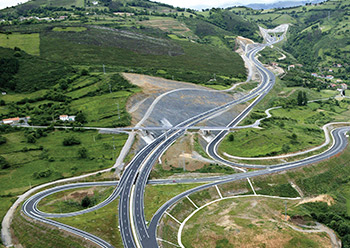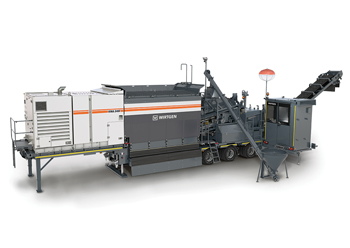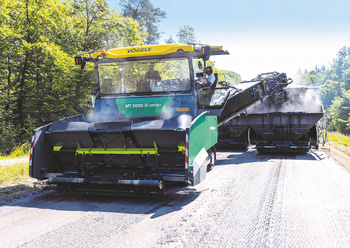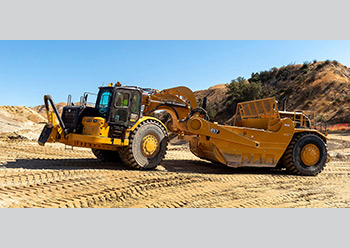
 Wirtgen’s new cold recycling mixing unit.
Wirtgen’s new cold recycling mixing unit.
Wirtgen says its new KMA 240(i) cold recycling mixing plant produces mix/cold mix that can be paved immediately and is suited to producing different types of bound base layers. In addition to cement-treated base layers (CTB) and roller-compacted concrete (RCC), the machine can also be used to produce bituminous bound base layers (with emulsion or foamed bitumen).
The different mixes can be used for a wide range of applications, including highway construction, road and path construction, and the building of parking lots or industrial areas, says a spokesman for the German company.
The cold recycling mixing plant is mounted on a flatbed semitrailer and has its own engine unit. This mobile design allows the system to be flexibly moved to different locations and set up rapidly.
“In its new cold recycling mixing plant, Wirtgen has combined the advantages of its earlier model, the KMA 220(i), which has enjoyed worldwide success, with improved mixing performance and an innovative cement metering system with automatic self-calibration via static weighing,” the spokesman says.
The powerful six-cylinder diesel engine is designed for the machine’s high mixing capacity of up to 240 tons per hour (tph). Thanks to an efficiently insulated housing, it also emits very little noise. The engine can be operated extremely economically for up to two days on one tankful. Its low emission values also allow it to be used in urban areas.
“With a capacity of 240 tph, the machine produces a full truckload of 20 tons of mix every five minutes. As a result, sections of a cement-treated or bituminous bound base layer with a working width of 4 m and a paving thickness of 15 cm can be completed over a length of 1,400 m every day,” he claims.
The KMA 240(i) impresses with its ability to process a large variety of non-cohesive base materials, which wheel loaders feed to the plant’s hopper via vibrating grids. This makes it possible to produce cold mixes from a wide variety of new granular mixtures or various milled materials and binding agents. Asphalt milled material, all other non-cohesive materials reclaimed from old road surfaces, and materials from RC processing can all be used to build new road surfaces in an environment-friendly manner. The ability to completely reuse the material results in high carbon dioxide and energy savings with minimal construction costs and project periods.
Silos or tank trucks supply the cold recycling mixing plant with binding agents, such as hot bitumen, bitumen emulsion, and cement. The precise metering of the input materials and binding agents, the ratio of which is determined in advance in the road construction laboratory, is monitored by a proven microprocessor control system. The KMA 240(i) ideally loads the new, homogeneous mix directly onto trucks or deposits it continuously on a stockpile.








.jpg)




.jpg)




























.jpg)


































